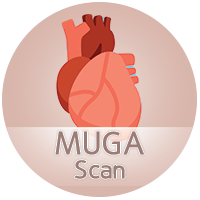CONTINUE READING...
Myocardial perfusion imaging (MPI) is a non-invasive imaging test that shows how well blood flows through (perfuses) your heart muscle. It can show areas of the heart muscle that aren’t getting enough blood flow. This test is often called a nuclear stress test. It can also show how well the heart muscle is pumping.
Myocardial viability scan is used to determine the extent of viable heart muscle tissue. This scan is mostly used for patients who have had previous heart attacks, and where a decision needs to be made as to whether heart surgery will provide significant benefit or not.
❰❰ PATIENTS INSTRUCTIONS
| • This procedure requires injection of radioactive material. | |
| • If there is a possibility that you are pregnant, please inform the Nuclear Medicine staff. | |
| • If you are breast-feeding, please inform the Nuclear Medicine staff. | |
| • Fasting is required for 4 hours. | |
| • 12 hours before the test STOP caffeine products such as: | |
| o Coffee. | |
| o Tea. | |
| o Chocolates. | |
| o Colas. | |
| • 12 hours before the procedure STOP smoking. | |
| • STOP* the following medications before the procedure: | |
| o Beta and Calcium blockers (e.g. Concor and ED drugs): 24 Hours. | |
| o Drugs that contain xanthines (e.g. Theophylline): 12 Hours. | |
| o Nitrates: 8 Hours. | |
| * Check with your referral doctor if these medications can be withdrawn before the procedure. | |
| • Do not stop other medications. | |
| • Diabetic Patients: bring your insulin or oral hypoglycemic drugs. | |
| • Asthmatic Patients: bring your inhalers. | |
| • Bring necessary clothes, towels, shoes, for the possible exercise inclusion in the test. | |
| • For 4 hours after the injection: Drink plenty of water and empty your bladder frequently. | |
| • This procedure requires injection of radioactive material. | |
| • If there is a possibility that you are pregnant, please inform the Nuclear Medicine staff. | |
| • If you are breast-feeding, please inform the Nuclear Medicine staff. | |
| • Fasting is required for 4 hours. | |
| • 12 hours before the procedure STOP smoking. | |
| • STOP* the following medications before the procedure: | |
| o ED drugs: 48 Hours. | |
| o Nitrates: 8 Hours. | |
| * Check with your referral doctor if these medications can be withdrawn before the procedure. | |
| • Do not stop other medications. | |
| • Diabetic Patients: bring your insulin or your oral hypoglycemic drugs. | |
| • Asthmatic Patients: bring your inhalers. | |
| • For 4 hours after the injection: Drink plenty of water and empty your bladder frequently. | |
❰❰ RADIATION SAFETY
Nuclear medicine diagnostic procedures are safe except for pregnant ladies, unless it is requested by the physician for exceptional cases. However, the procedure better to be discussed with the doctor to know the desired benefits of the test and the alternative procedures, or you can ask the the nuclear medicine specialist about the procedure.
No, you shouldn’t because nuclear medicine scans use high-energy radioisotopes, the radiation passes directly from the other person without interacting with tissues. In contrast, wearing a lead apron slows down the radiation beam, which allows it to deposit its energy in the body and interact with tissues.
The risks from diagnostic doses are usually small compared to other lifetime risks to which the patient is exposed to and the amount of radiation dose in most diagnostic procedures is less than an x-ray, CT scan, or fluoroscopy.
When the body is exposed to radiation, tissue damage may occur, which in turn may damage DNA or chromosomes, increasing the risk of genetic mutations. When a fetus is exposed to radiation doses, it may cause abnormalities in an organ or irreparable damage and if the radiation dose is too high, it may cause the death of the fetus.
The radioactive dose used in diagnostic procedures in nuclear medicine is very low, unlike radiation treatments in which the amount of radioactive dose is high and this gives the desired effect on the tissues or organs when radiotherapy. That is why the patient must undergo a pregnancy test in the event of suspicion or if the pregnancy is uncertain before starting the therapeutic doses.
In diagnostic procedures the radioactivity is very low. However, the patient may be asked to maintain a distance of approximately one meter between him and his family members for a period of time given by the nuclear medicine specialist to protect them from exposure to radiation.
One the other hand, in therapeutic procedures, the patients may present some slight risk to their family members if they do not follow the INSTRUCTIONS ON RADIATION SAFETY given to them by the nuclear medicine specialist.

Leave a Reply